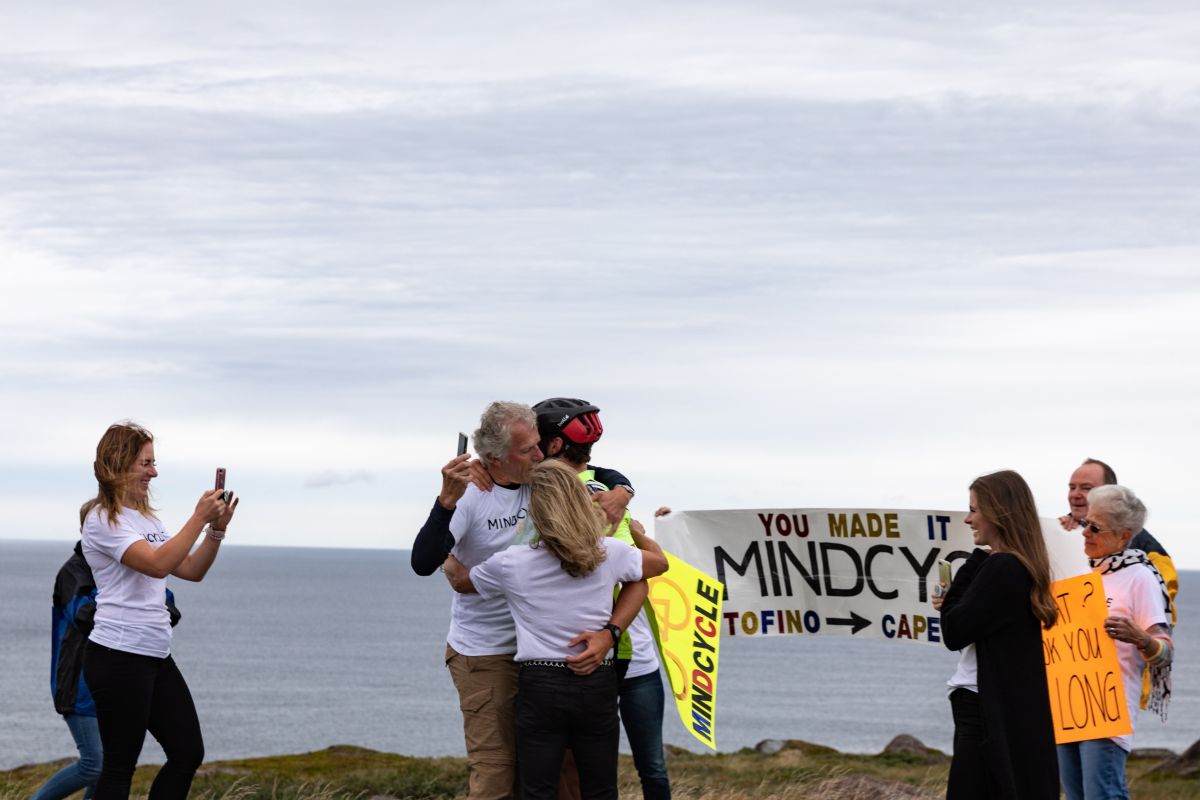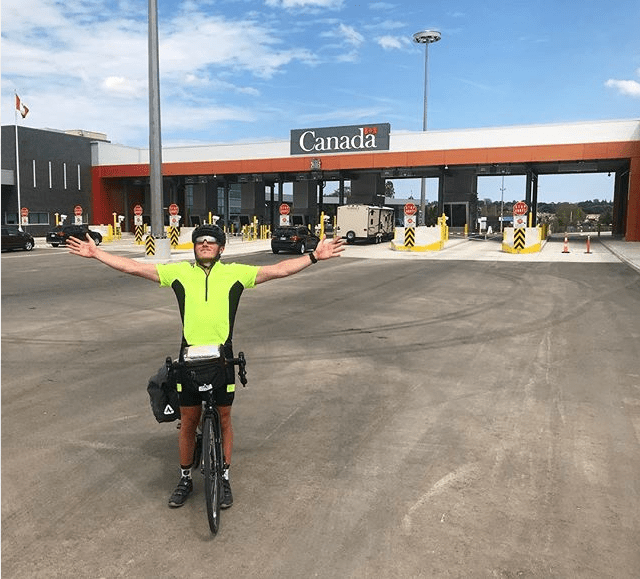Ask Oli: Ryan Martin reflects on his cross-Canada ride for mental health
A touching story about a young man's journey across the country to raise awareness and money for the Canadian Mental Health Association


We last checked in with our friend, Ryan Martin, in July.
As a quick refresher, Ryan is a 24-year-old cyclist living in Guelph, Ont. This summer he rode across Canada to raise money for the Canadian Mental Health Association. It’s a cause that’s close to home for Ryan, as he has been dealing with anxiety and depression for years, and most recently, was diagnosed with bipolar disorder.
I decided to check in with him after his ride and thought I’d share some updates.
How long did the ride take? Give me some numbers if you can.
The ride took about 120 days, combined riding and rest days. Approx. 61 km climbed and 10,000km ridden. I’d say there were about 100 days on the bike.
You had said before you set out that your three main goals for this journey were to share your story; educate people on effective methods of dealing with mental health issues; and to instill courage in others to open up about their mental health. Would you agree that you’ve accomplished these goals?
Absolutely! I think the impact I made was greater than I ever expected. And that’s only based on the people I heard from. I think there were hundreds or thousands of people that were inspired by Mindcycle that weren’t directly vocal about how it impacted them. People’s lives could’ve been saved and people became more confident and optimistic about their mental health. Another area of impact I’m pumped about is educating people who don’t suffer but have loved ones that do. This helps people get the support they need from their family and friends and reduces the ignorance and stigma within families and social circles.
RELATED: Oli asks Ryan Martin about across Canada bike ride in support of MindCycle
Clearly, you’ve succeeded in sharing your story, and I’m wondering if you have any particular examples of times when you saw others courageously open up when speaking with you.
Oh man, I don’t know where to begin, there’s just too many. One of the most impactful experiences on me was in the Fraser Valley in BC. I was near a town called Boston Bar, finishing a long day, and a big pick-up truck aggressively swerved onto the shoulder in front of me. I was like, “Great, this guy is going to yell at me for taking up to much space on the road.”. Keep in mind, my jersey says “Cycling Canada for Mental Health”. I see his arm sticking out the window and he waved me over to the driver’s side door. I pull up, the door swings open, and I see his head pressed against the steering wheel. Then he turns towards me and his face is totally red and he’s balling. After maybe 10 seconds, he finally says, “Thank you… I’ve been suffering from PTSD for so long, and I don’t know how to deal with it or talk about it. Thank you for what you are doing.”. Then, he handed me a $20 bill and drove away. I was in shock. As I biked the last few kms to the motel, I couldn’t stop thinking about the fact that, here I am, in the middle of the mountains, and there are people desperate for help. This was only one of the hundreds of encounters I had with people opening up to me. By the end of my trip, it became clear to me that mental health is one of the most common issues we face, but is, by far, talked about the least. That’s the biggest learning of my trip. There’s so much work to do.
You told me that you expected the biggest challenge to be to touch enough people with your message and make enough positive change. In my opinion, you’ve certainly done that. Would you agree?
100 per cent. I was really happy with the media coverage Mindcycle received, which meant my messages were broadcasted more than I could do with my own channels.
What unexpected challenges did you face?
The volatility of my moods was also way worse than I expected. I knew I’d struggle mentally, but I didn’t think it would’ve been so bad, so frequently. The fact that I was always tired, mostly alone and in the elements contributed to the volatility. Managing my moods was by far the hardest part of the trip. I could finish a great day of biking, feeling connected with family and friends back home, be in a beautiful setting, and my mood would change on a dime and I’d be having suicidal thoughts just like that. But, being tested in so many mental situations, forced me to learn so much about managing my mental health. I learned so many new tools and gained the confidence to persevere in the hardest times. I learned how to listen to my body and do what’s best for me. I learned the crucial ability to talk about how I’m feeling with my support system. I learned that people want to help me and to not hesitate to reach out, even if it feels ridiculous.
Briefly, what was the hardest day?
Hardest physically was the Cabot Trail in Cape Breton. Two huge mountains with climbs with 11 per cent gradients for multiple kilometres. Hardest day mentally was in the Gaspé in Quebec. My mental state deteriorated throughout the day to the point that I had to pull off the road and spend 10 minutes doing slow breathing to calm myself down and control the scary thoughts.
What was the best day?
A couple best days. My first day on the road leaving Tofino was incredible. It was 130 km through the mountains to Port Alberni, with no civilization or cell service in between. I felt so inspired and free and had no idea how the next four months would unfold. Also, this is when it set in that I was following my dreams.
Another one was arriving in Tobermory, Ont. from the ferry on Manitoulin Island. I was greeted by a huge group of family and friends, and a bunch of us biked the 100 km ride to my cottage. Being on my own so much, made me appreciate how great of a family and friend network I have. Lastly, the day I arrived in Cape Spear, Nfld. I think I went through every type of emotion possible that day. At first, I didn’t know how I should feel. I cried, laughed and screamed (because of the hills) in the last 10 km. When I saw my family, I broke down. At the finish line, I dropped my bike embraced my mom and then dad. I remembered sobbing, but it wasn’t crying – something I’d never experienced before. I think it’s because I’ve never worked so hard and so long at something. Everything I went through to get to that point, all the breakdowns, the screams, the pain (physically and mentally), flushed through my mind, it was completely overwhelming. Makes me emotional just typing this.
Who was your biggest supporter along the way?
I’d say, my mom. She was and still is my rock. Over the years, she’s learned how to calm me down in crisis situations and gives me so much hope and confidence.
How do you feel that this adventure has affected your personal mental health journey? Have things improved? Do you believe in yourself more? Have you better accepted your personal challenges?
The biggest change, I feel, is in my confidence to manage my day-to-day mental health. Being more aware of irrational thoughts, not getting so caught up in them, learning how to ride out a depression and how to manage a crisis situation. One of the biggest learnings is that this experience hasn’t reduced my struggles, but has made them more manageable. I have more tools, more motivation to keep pressing, a bigger support system and less shame. All of these things combined allow me to better manage my mental illness.
In a post you shared on Instagram, you quoted a friend that said: “If it doesn’t challenge you, it won’t change you.” In what way did the challenges you faced on this journey change you most?
I think of this quote in relation to my mental health. It’s the hardest times that force you to learn about yourself. If things were easy all of the time, you wouldn’t grow, you wouldn’t become a better version of yourself. If you approach struggle with the mindset that it’s unavoidable, and own it, you will persevere and become stronger each time. This is a life motto of mine.
Who would you like to thank?
Wow, where to start. First and most importantly is my mom, dad, sister and girlfriend. Not sure if I could’ve done it without them. This ride made me closer to all of them and it helped them better understand the complexity of my mental health. Also, my friends. They kept me motivated and their efforts to reach out kept me feeling positive and motivated. Everyone on social media. They boosted my energy and constantly reminded me of why I’m doing this.
What’s next?
My next journey is with the national office of the Canadian Mental Health Association (CMHA). They offered me a role as the National Lead of Youth Advocacy and Philanthropy. My job is to make the youth vision of the CMHA into a reality. Currently, I’m working on a project called MindStrong. This is a community of mental health champions, which are people with lived experience that work together, collaborate on strategies and become effective communicators of their story. At the end of the four-month program, the community hosts a public speaking event where each member (approx 10 people) shares their story with the audience. The goal is to bring the community members to a place where they are fully accepting of the mental health and are confident in sharing their stories. We should be launching a pilot project of MindStrong in early 2019.
Ryan, thank you again for all that you have done and are doing. Following along has been truly inspiring. The degree to which you’ve contributed positively to the collective mental health of those who struggle in Canada is truly incredible. I really look forward to seeing what you achieve on your new adventure.
Congratulations on your journey, and your new job.
Oliver Evans 20-year-old cyclist from Winnipeg who will be racing with Trek Red Truck Racing in 2019 currently living, riding, studying and working in Victoria.

